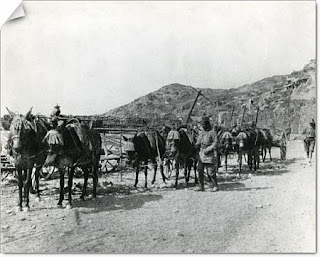THE ORIGINS OF GRANDMA'S ARMY - I
After the outbreak of WWI, Zeev
Jabotinsky and Joseph Trumpeldor submitted a resolution to the
commander of British forces in Egypt, asking him to form a Jewish Legion, and
propose to England its usefulness in Palestine. The commander told his Zionist
visitors: "Under the law I am not entitled to accept foreigners into the
British army. I can offer you only one thing: to form a mule transport unit
from your young people and send it to a different Turkish front".
In April 1915 “the Zion
Mule Corps”, so named by its commander Colonel John Henry Patterson, sailed
from Egypt to Gallipoli. It consisted of 562 mostly Palestinian Zionists, five
British officers, eight Jewish officers and 750 mules. As the Zion Mule
Corps was the only transport unit on the peninsula, it was soon involved in
transporting water, ammunition, food and other supplies to the front lines - under heavy fire. Probably, this was the first purely Jewish fighting corps that
went into action since Jerusalem fell to the Roman armies, under Titus in AD 70.
Here was a group of several hundred
foreign, Jewish men who had volunteered to serve the Allied cause. They had
worked hard and served bravely. They were lauded by the international press, in
some cases long after the last ship had left Gallipoli.
For centuries Jews had been viewed as a passive people, but here was a different kind of Jew. Strong, brave, capable, and focused. These Jews introduced the world to how seriously they regarded their cause—the creation of a Jewish state—and what they were willing to do to achieve it.
In the midst of World War I, Jews again volunteered to join the British Army, to fight against the Ottoman Empire. However, the government refused to grant the battalion a specifically Jewish name. It was thus determined that foreign Jews wishing to fight in Palestine would join the 38th Battalion of the British Royal Fusiliers. A 39th Battalion comprised of American and Canadian Jewish volunteers, and a 40th Battalion of Palestinian Jews formed in 1918. They were unofficialy called The Jewish Legion.
Also aiding the recruitment efforts was the withdrawal of Russia from the war in December after the 1917 Revolution. Russo-Jews had previously refused to join the British military because they did not want to ally themselves with Russia. However, this new turn of events caused the Russian Jews to become more amenable to enlisting.
Just three months later, in November 1917, the British Government published the Balfour Declaration - solidifying its support, and recognizing the Land of Israel as the national home of the Jewish people. The number of Jews immigrating to the British Mandate of Palestine continued to grow. World Jewry responded positively to the Balfour Declaration, and such favour only aided in the recruitment efforts for the Jewish Battalions.



Comments
Post a Comment